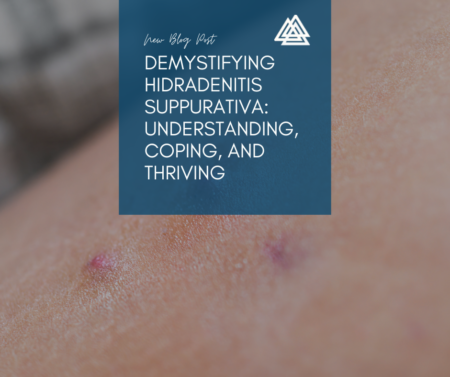 Hidradenitis suppurativa (HS) is a chronic skin condition that can be as challenging to pronounce as it is to live with. It affects approximately 1-4% of the global population, yet it remains relatively unknown and often misunderstood. This blog aims to demystify HS by providing an in-depth understanding of the condition, offering coping strategies, and highlighting ways to thrive despite its challenges.
Hidradenitis suppurativa (HS) is a chronic skin condition that can be as challenging to pronounce as it is to live with. It affects approximately 1-4% of the global population, yet it remains relatively unknown and often misunderstood. This blog aims to demystify HS by providing an in-depth understanding of the condition, offering coping strategies, and highlighting ways to thrive despite its challenges.
What is Hidradenitis Suppurativa?
Hidradenitis suppurativa is a long-term skin disease characterized by recurrent, painful lumps under the skin. These lumps, often referred to as nodules, can break open and leak pus, leading to tunnels under the skin (sinus tracts) and scarring. HS commonly affects areas of the body where skin rubs together, such as the armpits, groin, buttocks, and under the breasts.
Symptoms and Stages
The symptoms of HS vary widely among individuals but typically include:
- Painful lumps: These may start as pea-sized nodules that can enlarge and become more painful.
- Abscesses: The lumps can break open and release a foul-smelling discharge.
- Sinus tracts: Over time, tunnels can form under the skin, connecting different lumps.
- Scarring: Chronic HS can lead to significant scarring and skin changes.
HS is categorized into three stages, known as Hurley stages:
- Hurley Stage I: Single or multiple abscesses without sinus tracts and scarring.
- Hurley Stage II: Recurrent abscesses with sinus tracts and scarring, widely separated.
- Hurley Stage III: Diffuse or near-diffuse involvement with multiple interconnected sinus tracts and abscesses across an entire area.
Causes and Risk Factors
The exact cause of HS is not fully understood, but it is believed to involve a combination of genetic, environmental, and immune factors. Risk factors that may increase the likelihood of developing HS include:
- Genetics: A family history of HS can increase the risk.
- Obesity: Being overweight can exacerbate the condition.
- Smoking: Tobacco use is associated with a higher risk of HS.
- Hormones: HS often begins after puberty and can worsen with hormonal changes.
Coping with Hidradenitis Suppurativa
Living with HS can be challenging, but there are strategies to manage the condition and improve quality of life.
- Medical Treatment: Consult with a dermatologist to develop a personalized treatment plan. Options may include antibiotics, anti-inflammatory medications, hormonal therapy, and biologics.
- Skin Care: Keep affected areas clean and dry. Use gentle, non-irritating cleansers and avoid tight clothing that can cause friction.
- Lifestyle Changes: Maintaining a healthy weight and quitting smoking can significantly impact the severity of HS. Consider a balanced diet rich in anti-inflammatory foods.
- Pain Management: Over-the-counter pain relievers can help manage pain. In some cases, your doctor may prescribe stronger medications.
- Mental Health Support: HS can take a toll on mental health. Seeking support from a therapist or support group can be beneficial.
Thriving with Hidradenitis Suppurativa
While HS is a chronic condition, many individuals find ways to thrive and lead fulfilling lives. Here are some tips to help you thrive despite HS:
- Stay Informed: Educate yourself about HS and stay updated on new treatments and research.
- Advocate for Yourself: Be proactive in your healthcare. Don’t hesitate to seek second opinions or change providers if you feel your needs aren’t being met.
- Build a Support Network: Connect with others who have HS through online communities or local support groups. Sharing experiences and tips can be incredibly empowering.
- Focus on Holistic Health: Prioritize overall well-being by incorporating stress-reduction techniques, regular exercise, and a balanced diet into your routine.
- Celebrate Small Victories: Managing HS is a journey with ups and downs. Celebrate the small victories and progress you make along the way.
Hidradenitis suppurativa is a complex and often misunderstood condition, but understanding it better can help demystify the challenges it presents. By adopting effective coping strategies and focusing on holistic well-being, it is possible to thrive despite HS. Remember, you are not alone—there is a community of support and resources available to help you navigate this journey.
